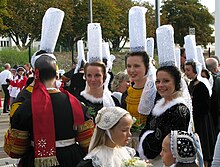Breton women wearing the Bigouden distinctive headdress, one of the symbols of Breton identity
Breton women wearing the Bigouden distinctive headdress, one of the symbols of Breton identity

The Beautiful Angèle by Paul Gauguin
布列塔尼半島(法語:Bretagne,發音:[bʁətaɲ] (![]() 聆聽);布列塔尼語:Breizh,發音:[brɛjs]或[bʁɛχ][1];加洛語:Bertaèyn,發音:[bəʁtaɛɲ])是法國西北部的一個半島,歷史上文化及行政上的一個地區名稱。布列塔尼半島的北部面向英吉利海峽,南部對著比斯開灣,古城阿摩里卡,範圍包括塞納河和羅亞爾河之間的沿海地區。整個半島的面積有34,023 km²。
聆聽);布列塔尼語:Breizh,發音:[brɛjs]或[bʁɛχ][1];加洛語:Bertaèyn,發音:[bəʁtaɛɲ])是法國西北部的一個半島,歷史上文化及行政上的一個地區名稱。布列塔尼半島的北部面向英吉利海峽,南部對著比斯開灣,古城阿摩里卡,範圍包括塞納河和羅亞爾河之間的沿海地區。整個半島的面積有34,023 km²。
凱爾特人是布列塔尼半島最早的居民,而布列塔尼亦是昔日的六個凱爾特邦國之一[2][3][4][5]。後來布列塔尼半島被凱撒征服,成為羅馬的魯格頓西斯行省。5世紀時,不列顛人入侵,所以這塊西北端地區被稱作布列塔尼,外號小不列顛(與大不列顛相對)。
布列塔尼半島由克洛維一世征服,但無論是墨洛溫王朝還是加洛林王朝都未能完全統治此地域。13世紀法國提出領土要求,但一直到15世紀,這裡還是獨立的邦國。1532年,布列塔尼與法蘭西王國合併,失去其公國的地位,布列塔尼半島被併入法國,成為法國的一個省,其省級地位一直持續到法國大革命時期。
https://en.wikipedia.org/wiki/Brittany
DW Euromaxx
The word Brittany, along with its French, Breton and Gallo equivalents Bretagne, Breizh and Bertaèyn, derive from the Latin Britannia, which means "land of the Britons".
布列塔尼(Brittany)這個詞,連同它的法語、布列塔尼(Breton)和加洛(Gallo)等價詞布列塔尼(Bretagne)、布賴日(Breizh)和貝爾泰恩(Bertaèyn),源自拉丁語不列顛尼亞,意思是“不列顛人的土地”。


沒有留言:
張貼留言